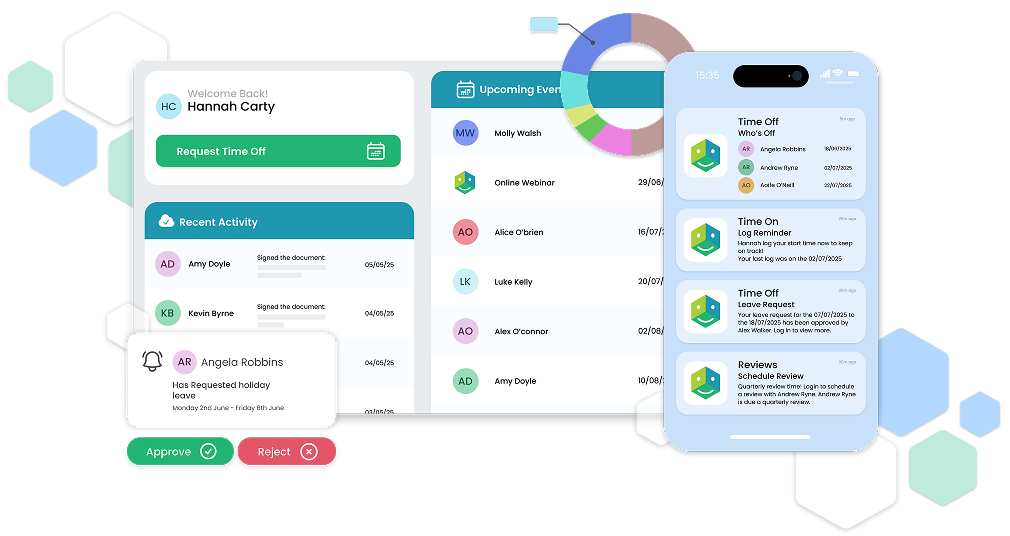Long gone are the days when environmental, social, and governance (ESG) principles were mere add-ons to corporate strategy. Today, they’re pivotal to business growth, innovation, and resilience in a rapidly evolving world. Like the outdated annual performance review, old business models that neglected ESG considerations are no longer fit for purpose.
The Transformative Power of ESG
On April 17th 2024, we hosted Darragh Gaffney, Director of Growth and Sustainability, who shed light on the seismic shift in how businesses approach growth.
Companies like Logitech and Patagonia aren’t just surviving; they’re thriving by embedding ESG principles at the core of their strategies. This is not about ticking boxes—it’s about setting a new standard for success.
Strategic Integration of ESG
Integrating ESG isn’t just a top-down directive; it involves everyone, from the boardroom to the newest recruits. Darragh underscores the necessity of embedding ambitious ESG targets throughout organisational practices, not as a siloed checklist but as a fundamental aspect of every project and policy. This approach isn’t just good ethics—it’s smart business.
ESG and Competitive Advantage
Early ESG adopters gain a significant competitive edge. For both sprawling multinationals and agile startups, a robust ESG strategy isn’t just about growth; it’s about leading the market. The statistics speak for themselves: companies committed to ESG principles often see growth rates surpassing their competitors by at least 20%. In the startup ecosystem, ESG is embedded from day one—not just because it’s savvy, but because it’s right.

Employee Engagement and Corporate Culture
Just as continuous feedback has replaced annual performance reviews in progressive companies, constant engagement with ESG values is reshaping corporate cultures. Employees today aren't just working for a paycheck; they’re looking to align with organisations whose values mirror their own. A genuine commitment to ESG helps attract top talent and reduce turnover, fostering a workplace where employees are not just present but engaged and invested.
C-Suite Perspective on ESG
To C-suite executives traditionally focused on the bottom line, ESG represents a paradigm shift. That's why it's crucial to communicate the tangible benefits of ESG in terms familiar to financial leaders – like risk mitigation, cost reduction, and trust enhancement. It’s about showing that sustainable practices aren’t just ethical—they’re beneficial for the bottom line.
Customer and Financial Implications
Today’s customers and investors are savvy; they can see through greenwashing and demand genuine ESG commitments. Financial institutions are also recognising the value of sustainability, offering better terms for companies with strong ESG frameworks. This economic incentive is motivating more companies to take ESG seriously—not just as a moral imperative but as a financial strategy.
Mergers, Acquisitions, and Sustainability
Sustainability by acquisition is becoming a strategic approach for companies looking to bolster their ESG credentials quickly. This trend underscores the growing importance of sustainability in business valuation and market positioning.
Challenges and Future Outlook
The road to robust ESG integration is fraught with challenges, primarily around data management and regulatory compliance. Like the shift from annual reviews to continuous feedback, the transition to comprehensive ESG integration requires ongoing education, adaptation, and commitment across all levels of an organisation.
Supporting ESG Growth
Various support mechanisms, from government grants to private funding initiatives, are available to companies striving to enhance their ESG strategies. These resources are vital for businesses looking to lead in sustainability and social responsibility.
ESG is not just a trend but a transformative element that’s redefining success in the business world. The move towards integrated ESG strategies is about adapting to the demands of a modern, ethical, and dynamic business environment. Companies that embrace this shift are not only setting themselves up for sustainable growth but are also paving the way for a more sustainable world.
Who Does ESG Reporting Apply To
EU rules require large companies and listed companies to publish regular reports on the social and environmental risks they face, and on how their activities impact people and the environment.
Presently, this requirement falls under the Non-Financial Reporting Directive 2014/95/EU. However, the NFRD has faced significant criticism for its limited disclosure requirements and scope. So, in 2021, the European Commission proposed the Corporate Social Responsibility Directive (CSRD) 2022/2464/EU as a replacement.
The CSRD strengthens and broadens the existing regulatory framework of the NFRD. The eligibility criteria are much stricter, expanding the scope from 11,700 companies under the NFRD to around 50,000 in the EU.
A phased implementation was planned for January 2024. However, on April 3rd 2025, the EU Commission voted to postpone CSRD compliance by two years for all companies, except for those in the first wave of the previous NFRD.
Here’s the breakdown of the new reporting timelines:
- First wave: Companies that were already reporting under the NFRD (i.e., large listed companies and public-interest entities with over 500 employees) still need to report according to CSRD as planned for FY2024 (in 2025).
- Second wave: Large companies with more than 250 employees that previously needed to report in 2026 (FY 2025) will now report in 2028 (FY 2027)
- Third wave: Listed SMEs that previously needed to report in 2027 (FY 2026) will now report in 2029 (FY 2028)
Companies subject to the CSRD have to report according to European Sustainability Reporting Standards (ESRS). This includes:
- Large undertakings
- SMEs (excluding micro-undertakings) with transferable securities admitted to trading on an EU-regulated market
- Parent undertakings of large groups
- Undertakings governed by the law of a third country that have either transferable securities admitted to trading on an EU regulated market or that have business in the territory of the Union above certain thresholds.
The Department of Enterprise, Tourism and Employment (DETE) provides a comprehensive guide to CSRD regulations.










